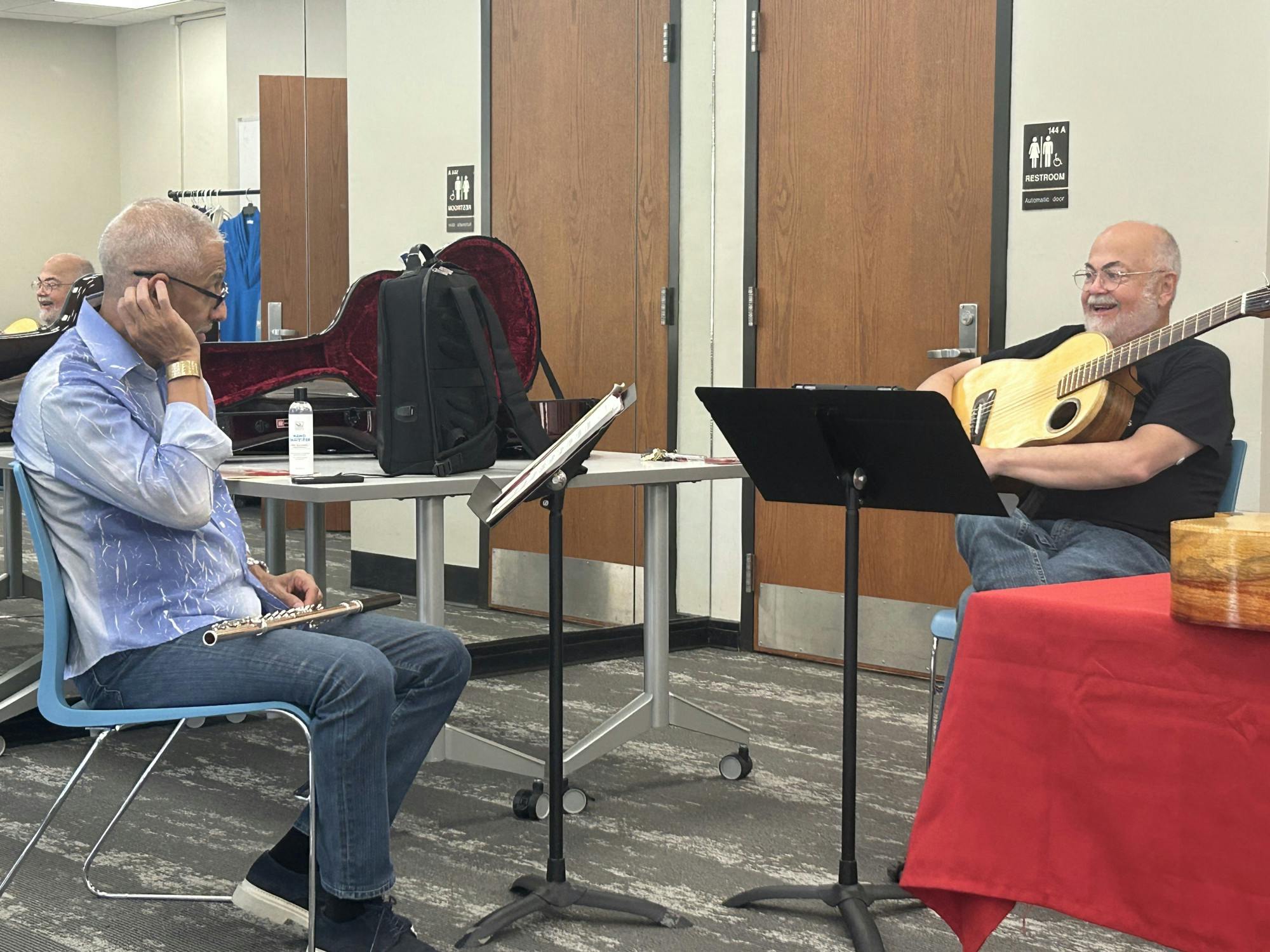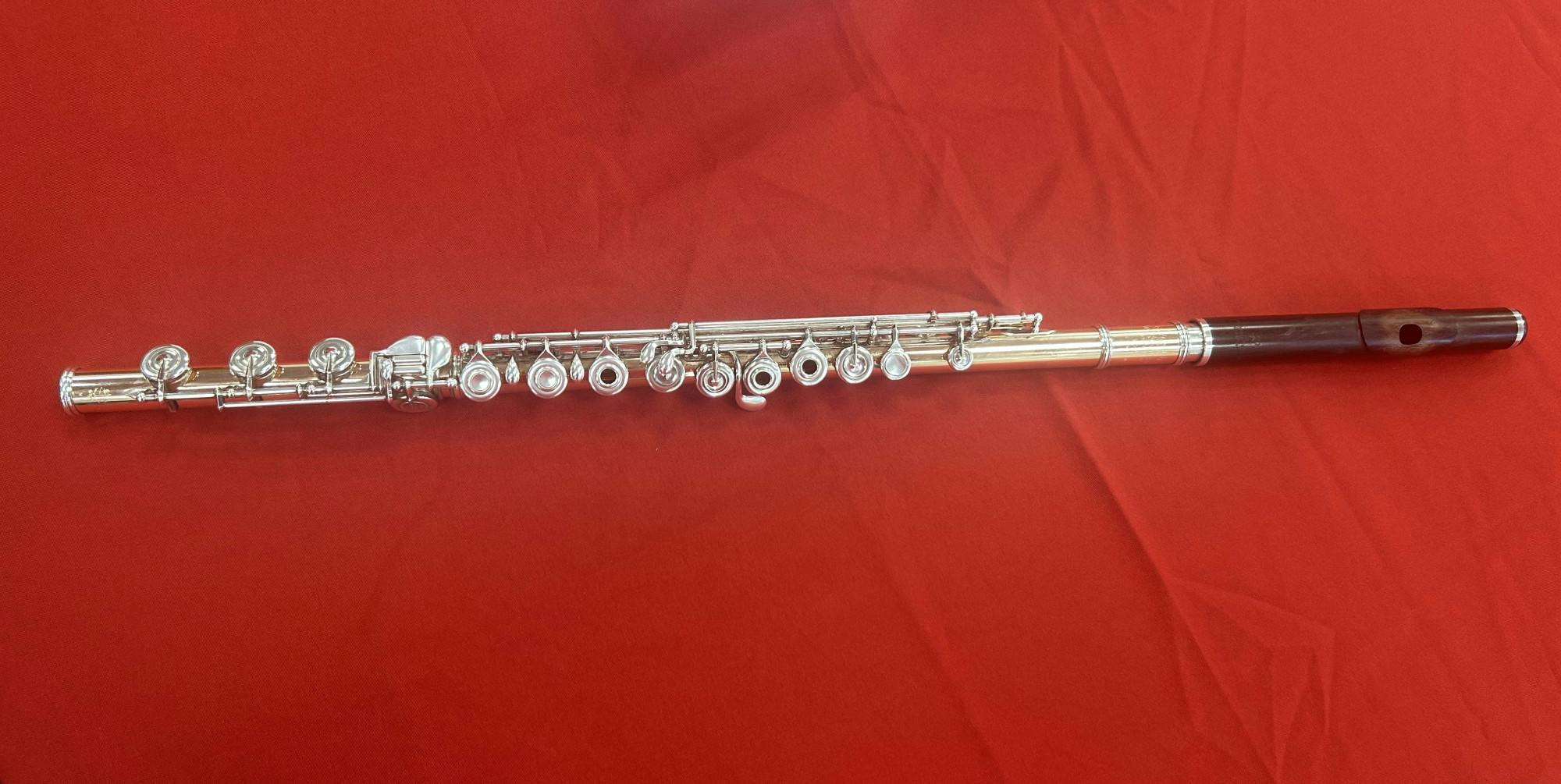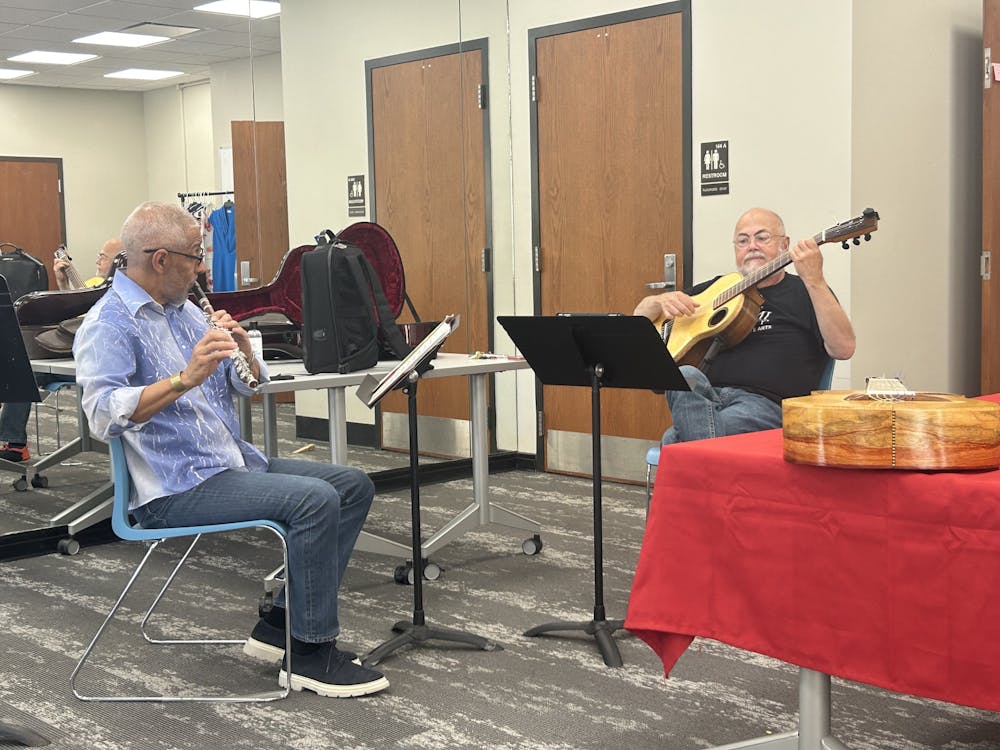Latin jazz artist Nestor Torres, who arrived at Miami University for a week-long residency on Monday, entered the Center for Performing Arts green room for a rehearsal with Thomas Garcia, associate professor of Ethnomusicology and Latin American Studies at Miami.
Torres and Garcia lightly conversed across their rehearsal, floating naturally between English and Spanish. With only a few days spent together, they already felt like close friends practicing together as they traded comments about the music they played, their instruments and Torres’ experience in Oxford (including an apparently eventful trip to Walmart).

Torres and Garcia take a break and trade stories during their rehearsal together.
As the duo ran through several songs together, the passion with which Torres approaches his craft was clear on every note — including the ones he slightly messed up and profusely apologized for.
Even with so much experience behind him, Torres is still learning.
“There’s always that feeling of ‘I should know better’ or ‘I need to be better prepared,’” Torres said. “To have that kind of sense of reaching for something better always. It’s very grounding, and ultimately it’s very healthy.”
During his time at Miami, the musician has performed at Miami’s Hamilton campus, spoken about music and peacebuilding at Shriver Center and advised on entering the music industry at the Center for Performing Arts.
By his own admission, he’s gotten just as much of an education from his time here as the students he’s spoken to.
“I’m so inspired. I was moved almost to tears by a student this morning,” Torres said. “What brought him here all the way from China? … That kind of seeking spirit to travel across the world seeking your mentoring, that kind of seeking spirit? It’s just remarkable.”
Born in Puerto Rico, Torres was given an early exposure to music.
“My father was a musician, so I was always surrounded by music,” Torres said. “I was a pretty curious kid … always asking the tough questions and while most kids were playing I would be practicing my flute.”
Enjoy what you're reading?
Signup for our newsletter
That flute, Torres’ primary instrument of choice, was chosen simply because “it was different.” And the music he makes with it is beautiful. He’s able to express a vast range of emotion — love, sadness, excitement, longing and more.

Torres' flute that he has rehearsed and performed on during his time at Miami.
After moving to New York at 18, Torres became immersed in the city’s music scene alongside his education at Mannes School of Music. This eventually took him to Miami, Florida, where he encountered his first real taste of success and a major setback: a serious boating accident that left him with 19 rib fractures and numerous other injuries, including a collapsed lung.
“That process of recovery and coming back was not so much a musical challenge or physical challenge but it was an emotional or mental challenge because my life fell apart,” Torres said. “I did not know how much impact I had caused my community at the time. So they were also instrumental in guiding me to recovery … and so I did, but it was slow.”
Another significant moment for Torres was the day he won a Latin Grammy Award: Sept. 11, 2001.
“I was nominated and I was very much looking forward to it. It was pretty much the center of my attention,” Torres said. “And in one single moment it just became meaningless.”
Torres returned to New York shortly after 9/11 and performed a series of concerts at various places of worship near ground zero. This was a turning point in how he perceived his music.
“My thought process at the time was, if the work I do cannot contribute or keep people from doing that, then it meant nothing,” Torres said. “I have always been focused on doing music that will encourage and inspire people based on what I call rehumanizing the heart of the people.”
Over the last few decades Torres’ accomplishments have continued to grow, including nominations for both the Grammy Awards and Latin Grammys.
Helane Androne, professor and faculty affiliate for Global and Intercultural Studies, said that when Miami was looking for someone to visit the college for Hispanic Heritage Month, Torres was the first person she thought of — both as an artist, and a personal friend.
“In my mind, it goes back to the conversation that I had and this friend I had made in Nestor, and of course his body of work, I’d seen him perform, I knew of his work,” Howard said. “And then it grew into a collaboration between Oxford, OIDI , the regionals DEI office, the music department, the Grayson Kirk Lecture Series … it just grew.”
This collaboration seems to have paid off, as Torres had high praise for his experience at Miami.
“The faculty of Miami University and the folks I’ve interacted with really care about the students,” Torres said. “They’re student centric, and most importantly I have been supremely impressed with the students, the quality of the perspicacity.”
Despite all of Torres’ accomplishments and the impact his music has had on his fans, he still said he doesn’t feel like he’s “made it.”
“To make it is to live your life through the final moments, striving to be the best you can,” Torres said. “I am successful. Yes, I have done many things in my career, but there are many others that have yet to be done.”
Torres will give a guest performance and lecture in Souers Recital Hall on Thursday, Sept. 21. He will also perform at the 20th Latin American and Caribbean UniDiversity Festival in Uptown Oxford on Friday, Sept. 22.




